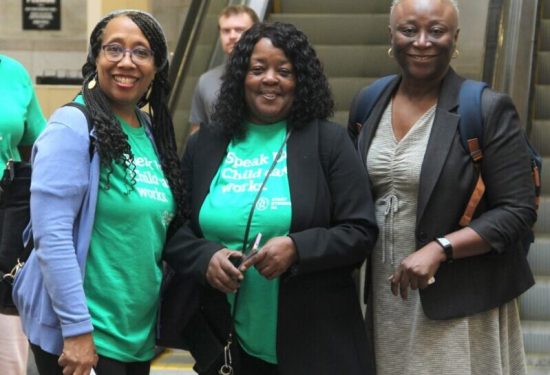After watching the terrifying coverage and seeing the devastating images from Hurricane Helene, the team at Home Grown did what we often do: We reached out to partners to better understand how providers and families are doing. We reached out to partners in Asheville, Durham, Charlotte, Brevard, Boone, Atlanta, Greenville and many other communities along the path of Helene. Two things became very clear: Home-based providers in hard-hit Western North Carolina faced extensive damage and needed assistance.
With input from existing grantees and partners on the ground in Western North Carolina, specifically the Smart Start of Transylvania County and Family Child Care and Center Enrichment Foundation, we started to design this Emergency Fund to respond to the needs of the providers in this area. We know from other emergencies that while home-based child care providers are the backbone of their community in good times and bad, they are often an afterthought or excluded entirely in emergency response and aid. We also know that philanthropy can act quickly to address that gap and work to encourage public response to focus on home-based providers.
Emergency funding is deeply ingrained in the work of Home Grown with pandemic emergency response being our first significant program after our launch 5 years ago, and it had a defining influence on the work of Home Grown. In that instance we developed a manual to guide emergency funding and worked closely with 13 partners around the country, ultimately deploying $2.7 million in funding from Home Grown and local and public funders to 2,500 providers, both family, friend and neighbor (FFN) and family child care (FCC).
The Home Grown pandemic emergency fund supported major learning for our organization and seeded the early ideas for the Thriving Providers Project, a direct cash transfer program that provides unrestricted cash support to home-based child care providers in various communities across the country. Embedded in the principles of this program, and learned via our emergency fund effort, is that home-based child care providers know best what they need and our role is to get them funding as quickly as possible with the most flexibility in the use of these funds. Furthermore, we have developed a national team of organizations and partners around this project who proved essential to the rapid design and set up of the Home Grown Home-Based Child Care Emergency Fund for Severe Weather & National Disaster Response.
The Home-Based Child Care Emergency Fund for Severe Weather & National Disaster Response seeks to get cash aid to diverse home-based child care providers who are impacted by events like Hurricane Helene and Hurricane Milton. The Fund has been designed with input from local providers and partners to do the following:
- Get funding to providers and caregivers quickly without onerous or extractive application processes.
- Connect providers to the Fund via trusted partners that they are already in relationship with.
- Ensure funding can reach providers in disaster-appropriate ways including multiple payment options.
- Do no harm to providers by ensuring tax and benefits status will not be negatively impacted.
Home Grown was able to quickly get this fund up and running because of the incredible partnerships we have in place. We were able to rely on our partner, Beam, to build an application and payment tool in just days. Beam currently supports the Thriving Providers Project’s pilot sites in managing their applications and payments, and transferred their significant knowledge from that project to benefit the Fund. The Emergency Fund application enables providers to apply in less than 5 minutes and allows our team to track application progress. It also allows providers to select their method of payment. We were also able to call on our benefits protection consultants (and an author of our Thriving Providers Project Benefits Protection Toolkit), Kimberley Drew and Jennifer Kellet, to advise and support the design that would not disrupt providers’ public benefits or create adverse tax implications.
Our writing consultant, Anne Vilen, who resides in Asheville, immediately began interviewing providers and documenting their experiences (read more from her here).
Lastly, and most importantly, Home Grown was able to engage provider-serving networks to co-design and implement this program. Because of our existing partnerships with Smart Start of Transylvania County, the Family Child Care and Center Enrichment Foundation and El Telar, we were able to move quickly to reach and serve providers affected by this disaster. These organizations are on the front line providing so many forms of practical and emotional support to providers impacted by this disaster. We are expanding to work with other partners in the area including the Child Nutrition Program, Inc, a federal food program sponsor that works with North Carolina-based home-based child care providers. Home Grown has also made small grants to our partner networks, Superlative Academy and the Children’s Council of Watauga County, to assist providers in those areas who have had less impact but still needed support.
This Fund would not be possible without the financial support of Home Grown members and other funders who care deeply about home-based child care and the families that rely upon these caregivers. Home Grown seeded this Fund with $150,000 from its cash reserve and has been joined with contributions by our members, Spring Point Partners and the Bainum Family Foundation, as well as other funders including the Bezos Family Foundation and the Stella and Charles Guttman Foundation. The Fund currently has $650,000 with additional pending requests.
As we publish this blog post, over 120 home-based providers in North Carolina have received either $800 or $1,500 in cash aid from the Fund. We anticipate serving an additional 100 providers in the state and offering a second round of funding to providers most hard hit. We are also gearing up to expand aid to Florida in the wake of both Hurricanes Helene and Milton. Home Grown is committed to sharing what we learn along with our partners in this work and to working to ensure home-based providers are prioritized in public disaster aid.
We invite you to join us! If you are a funder who would like to contribute, if you are a provider in a disaster-impacted area, or if you serve providers in these areas and want to connect your members to the Fund, please reach out to us at EmergencyFund@homegrownchildcare.org.
I want to acknowledge the hard work and dedication of our partners, the Family Child Care and Center Enrichment Foundation, Transylvania Smart Start, El Telar, the Child Nutrition Program, Inc., Beam, Kimberly Drew and Jennifer Kellett. I am in awe of the quick and efficient work of my team at Home Grown, specifically, Terry Hayes (project consultant and Fund manager), Emily Franchett (doctoral practicum student, New York University’s Dept. of Applied Psychology), and Clare Reidy (director of collaborative partnerships). Thank you to Anne Vilen, our consultant writer, for documenting the disaster and its impact on the providers of North Carolina. Many thanks to the funders who have committed to the Fund and to the Early Childhood Funders Collaborative for helping us get the word out.




